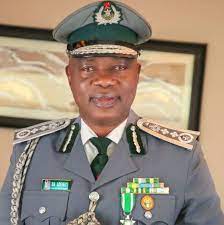The Director General, Nigerian Maritime Administration and Safety Agency (NIMASA); Dr Bashir Jamoh has raised hope of disbursement of the controversial Cabotage Vessels Financing Fund (CVFF) in 2020. He assured that, before the end of October, some beneficiaries of the fund will get it.
The NIMASA boss gave the assurance last week at a media parley to mark the first 100 days of the current management of the agency, even as he acknowledged that disbursement of the CVFF is long overdue.
He also confirmed that he has assumed the headship of the CVFF disbursement committee and that, it is the priority of the committee to put the delayed disbursement of the CVFF behind it.
He said: “I have just been appointed the Chairman of the CVFF disbursement committee by the Minister of Transportation. We are working to disburse the CVFF, before October, we will disburse the first leg of the fund to beneficiaries”.
On the controversial floating dry dock, the NIMASA DG said the agency is already in partnership with the Nigerian Ports Authourity (NPA) to fine-tune the proposed arrangement, which will entail moving the floating dock to the Apapa-based Continental Shipyard, which is owned by the NPA.
He disclosed that NPA is already in the process of winding up its contractual agreement with its foreign partners in the running of the Continental Shipyard. Once this is done, a Public Private Partnership (PPP) with an independent company to manage the floating dock will kick-off.
Jamoh also said that, the new arrangement will generate a revenue of about N1Billion monthly and that it will lead to direct employment of about 350 workers.
Apart from this, he explained that the multi-million dollar floating dock will boost Nigeria’s foreign exchange earnings.
In the area of stemming piracy, he said that in the last three months, a total of 27 alleged pirates were apprehended.
The NIMASA DG said that until last two months, no pirate had been arrested in Nigerian waters since 2016.
According to him, out of the 27 pirates that were arrested, 17 are in the custody of the Nigerian Police, while the 10 who were arrested by the Nigerian Navy in collaboration with NIMASA are currently facing trial under the new anti-piracy law.
The DG said: “This is definitely a test case for us, given that no pirate has been apprehended or arrested in the country since 2006. It is even more so given that we have a brand new Act and this is the first time suspects are being tried under the new legislation in the history of the country and what we make out of it would convince the global maritime community that we are serious with the anti-piracy campaign. It is a make or mar trial and we will put all efforts into it”.
Underscoring the resolve to battle criminality in Nigerian waters, Jamoh said, 156 personnel comprising of NIMASA staff, Navy, Police and NPA have so far been trained to battle criminality in Nigerian waters.
He also hinted that there will be further integration of the platforms of the Navy, NIMASA, NPA and the Police in the fight against all forms of criminality on Nigerian waters.
This, according to him will involve the Eye247 owned by the Police, NIMASA’s, C4i, NPA’s C3i and Navy’s Falcon Eye. He said the essence is to have a synergy among the various agencies.
While also speaking on the NIMASA’s Deep Blue Project, the DG disclosed that it has achieved about 85 per cent completion.
Giving details, Jamoh said, out of the 17 Special Mission Vessels that were ordered, 14 have arrived, the armoured vehicles are ready, two Special Mission Aircraft are expected in October, while the three Special Mission Helicopters are also expected to arrive in the country in January 2021.
Throwing light on why the fishing trawler; Hailufeng 11 and its crew were released, after they were arrested for illegal operations in Nigerian waters, the NIMASA boss explained that all the vessels in the area where the fishing vessel was arrested were investigated.
He said, the Navy did not have anything against the vessels, hence the ship was handed over to NIMASA for further investigation. “We don’t have anything to prove that they were doing illegal fishing, but they used to come to Nigeria to conduct certain operations with their AIS switched-off”’.
He however acknowledged that switching of any ship’s AIS is an offence, he added that the ship was fined N3Million for the infraction. He also attributed the relatively low fine to the Nigerian Merchant Shipping Act.
















Discussion about this post